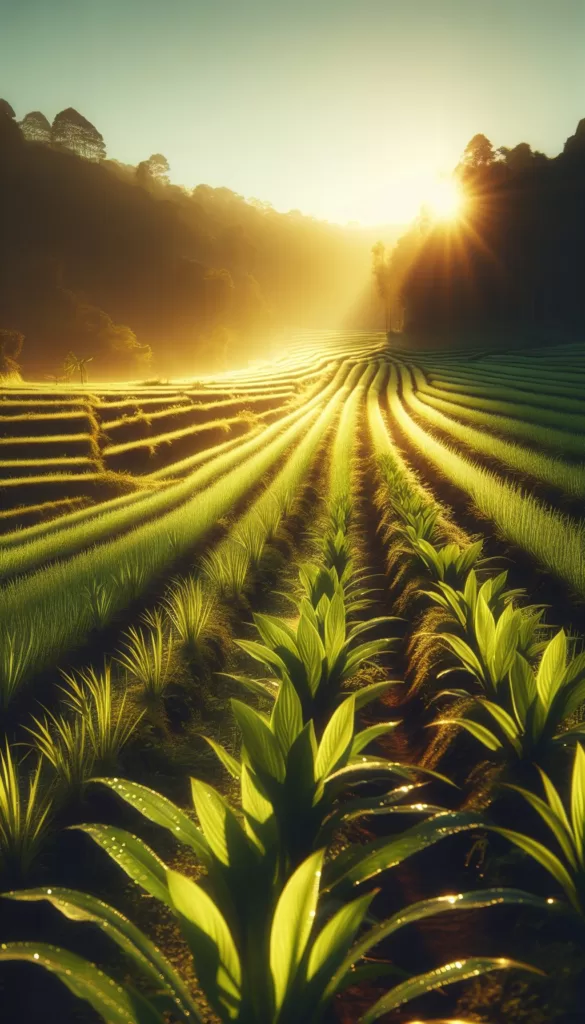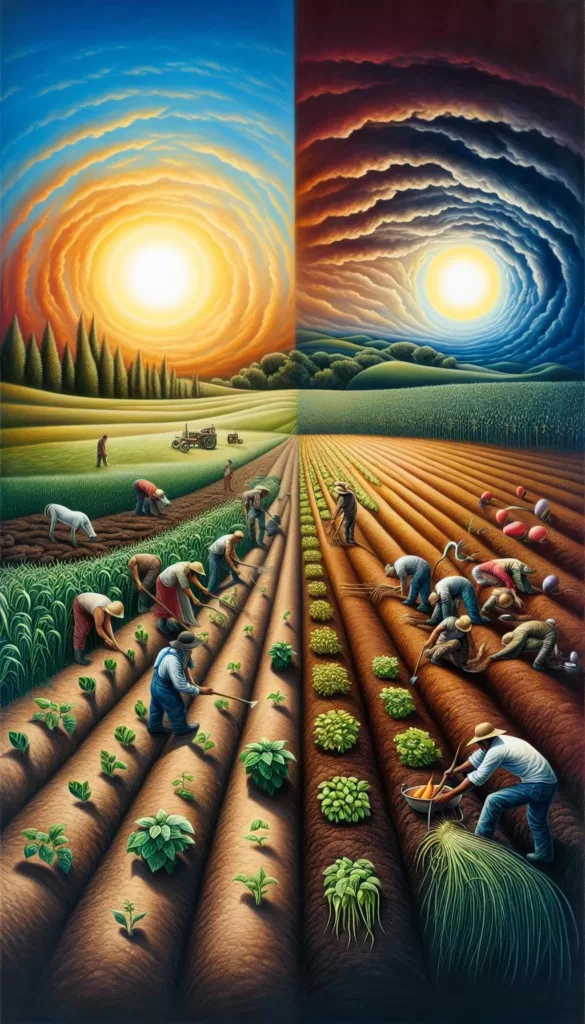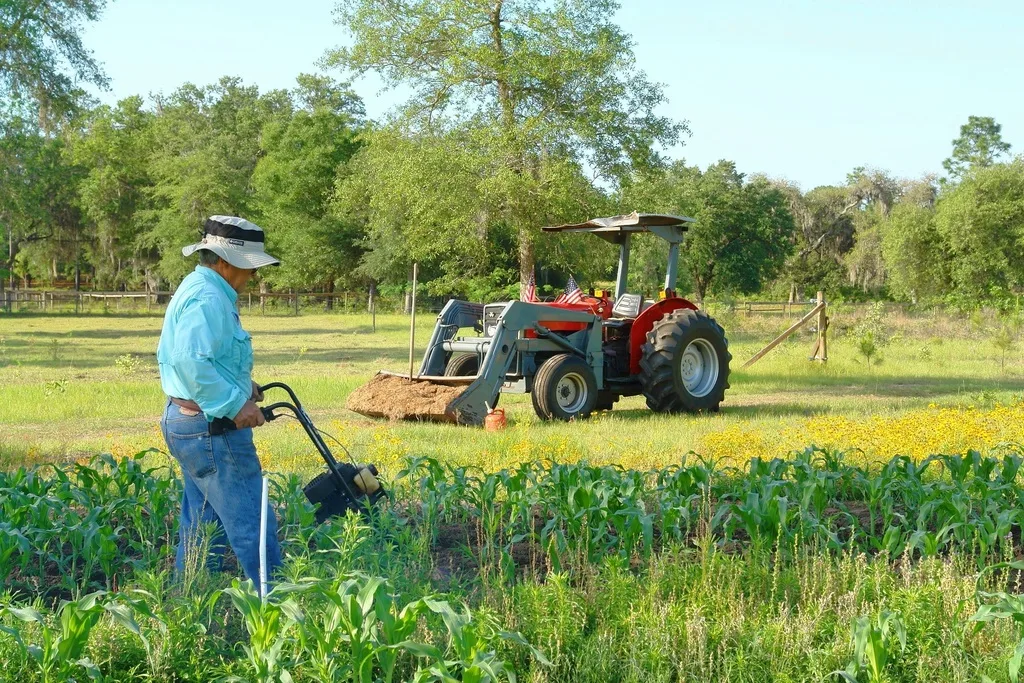In the world of farming and gardening, abundant harvesting often feels like a game of chance, heavily relying on a favorable climate and season. However, the success of crop growth can be significantly influenced through a method known as cultivation.
Farmers typically cultivate their plants during seasons when crops are most susceptible to withering. When executed correctly, cultivation can yield a multitude of benefits, playing a pivotal role in the healthy growth and development of plants. For more resources related to this topic, visit Garden and Grass.

Delving Deeper: What is Cultivation?
Often referred to as soil refinement, cultivation is the practice of tilling an existing bed of soil to prepare it for planting. The process employs various tools and equipment depending on the size of the soil bed you’re working with. You may choose from larger machinery like tractors or rototillers, or opt for hand tools such as shovels or soil forks.
The primary goal of cultivating is to transform your soil into an optimal environment for plant growth. Through this process, microorganisms residing beneath the soil bed are distributed evenly throughout the soil. This not only enhances soil fertility but also creates a nutrient-rich environment conducive to healthy plant growth.
Understanding the Significance of Cultivation
The process of cultivation, while presenting its unique challenges, is largely seen as a beneficial practice in the agricultural sector. This is due to its numerous advantages that often outshine the potential drawbacks. Cultivation not only paves the way for robust plant development and accelerated growth but also offers a multitude of additional benefits.
1. Weed Control: An Integral Aspect of Cultivation
One of the significant challenges faced by gardeners and farmers alike is the persistent problem of weed growth. Weeds, being unwanted plants, can be particularly harmful to planned crops or plants due to their fast growth and invasive nature. They tend to germinate on the soil’s surface, where they compete with crop plants for space, light, and nutrients. This competition may stunt plant growth, lower yield quality, and increase production costs.
Cultivation presents a practical solution to this persistent issue. It serves as an effective method for combatting these harmful weeds. How so?
- Tilling the Soil: During cultivation, the soil is tilled or turned over. This action disrupts weed growth by uprooting existing weeds and burying weed seeds deep into the ground where conditions are not favorable for their germination.
- Mixing of Soil: The mixing process that occurs during cultivation can cause weed seeds to be displaced from the topsoil layer to deeper layers where they are unlikely to sprout.
- Decomposition and Enrichment: As weeds are uprooted and buried during tilling, they decompose over time. This decomposition turns them into organic matter – a crucial component of healthy soil. Thus, ironically, these unwanted plants contribute beneficially by enriching the soil with organic material.
By incorporating regular cultivation into your gardening or farming routine, you can maintain control over weed populations and preserve the health and productivity of your soil. Remember that ‘prevention is better than cure’ – it’s easier to prevent weeds from growing than to deal with them once they’ve taken root!
2. Alleviating Soil Compaction: A Crucial Benefit of Cultivation
Soil compaction is often a significant obstacle for many farmers and gardeners. It’s a common but serious issue that can greatly hinder the success of your planting endeavors. When soil becomes compacted, its particles are pressed together tightly, reducing the pore space between them. This dense structure makes it challenging for seeds to penetrate the soil, thereby impeding their germination.
Understanding Soil Compaction
Soil compaction occurs due to various factors, such as:
- Heavy machinery or foot traffic
- Watering practices
- Natural settling over time
Compacted soil not only affects seed germination but also restricts root growth and limits the movement of water and nutrients in the soil profile. As a result, plants struggle to absorb the necessary resources they need to grow healthily and productively.
How Cultivation Alleviates Soil Compaction
Cultivation plays an essential role in alleviating soil compaction. The process involves breaking up the compacted soil, which results in:
- Reduced soil strength: By breaking down the dense structure of compacted soil, cultivation decreases its overall strength, making it easier for plant roots and seedlings to penetrate.
- Enhanced environment for seed germination: Loosened soil allows seeds to be sown at the correct depth, providing them with a more conducive environment for proper germination and growth.
Note: While cultivation is beneficial in preventing and alleviating soil compaction, it’s important to avoid excessive tilling as it can lead to erosion and loss of precious topsoil.
By understanding the negative impacts of soil compaction and how cultivation can alleviate these issues, you can implement more effective strategies for your gardening or farming practices. Remember that healthy soil is the foundation of successful planting – cultivate wisely and regularly to promote optimal plant growth!
3. Moisture Retention: A Key Benefit of Cultivation
One of the fundamental benefits of soil cultivation is its significant impact on moisture retention. Humidity, or the presence of moisture in the air and soil, is a crucial factor that determines the health and growth of plants.
Understanding the Role of Humidity in Plant Growth
To better understand why moisture retention matters, let’s delve into how plants function. Plants rely on a process called photosynthesis for their survival and growth. This is a biological process where plants convert sunlight and water into oxygen (which they release) and glucose (which they use as food). Essentially, this process fuels plant growth and sustains their life.
In this context, humidity plays two critical roles:
- It provides the necessary water component for photosynthesis.
- High humidity levels reduce plant water loss through transpiration (the plant equivalent of perspiration), thus conserving water within the plant.
Therefore, maintaining optimal moisture levels in your soil can directly contribute to enhancing the conditions necessary for photosynthesis and, subsequently, promoting healthier plant growth.
How Cultivation Enhances Moisture Retention
When you cultivate your soil — that is, when you break it up and turn it over — you essentially improve its structure. This enhanced structure increases the soil’s capacity to absorb and retain water more effectively.
“Think of cultivated soil as a sponge that can soak up water then slowly release it over time, providing a consistent source of moisture for your plants.”
Furthermore, cultivation also aids in:
- Improving water infiltration: Loosened soil allows water to seep down more easily, reducing runoff and ensuring that more water reaches the root zone where it’s needed most.
- Preventing surface crust formation: Regular cultivation breaks up crusty surfaces that can form after heavy rains or watering. These crusts can prevent water from penetrating the soil.
Cultivation can significantly optimize your soil’s moisture retention capacity, creating an environment that is conducive to effective photosynthesis and robust plant growth. As a gardener or farmer, understanding the relationship between cultivation, moisture retention, and plant growth can empower you to implement more effective strategies for your planting endeavors.
4. Boosting The Impact Of Soil Ameliorants: A Strategic Advantage of Cultivation
Often, the benefits of cultivation are closely tied to its impact on soil fertility and plant growth. One such benefit is the enhancement of soil ameliorant performance. These substances, often used by farmers and gardeners alike, play a crucial role in improving soil conditions and promoting overall plant health. Yet, their effectiveness can be dramatically augmented when combined with proper cultivation techniques.
Understanding Soil Ameliorants
Soil ameliorants are materials added to the soil to improve its physical properties. They include a wide range of substances such as:
- Lime, which reduces soil acidity
- Gypsum is used to improve soil structure
- Organic matter, which enhances nutrient availability
While each of these ameliorants serves a unique purpose, they all share a common goal – enriching the soil to make it more conducive for plant growth.
How Cultivation Enhances Soil Ameliorants
Cultivation involves tilling or turning over the soil. This process can significantly improve the performance of soil ameliorants in several ways:
- Enhanced Distribution: Cultivating the soil helps evenly distribute ameliorants throughout the ground. This ensures that they reach all parts of the plant roots and not just those on the surface.
- Increased Penetration: Tilled soil is looser and allows for better penetration of ameliorants. This means they can reach deeper layers of the soil where they’re most needed.
- Improved Interaction: As cultivation improves soil structure and water retention, it also optimizes the interaction between ameliorants and soil particles, making them more effective.
“Think of cultivation as an enabler that amplifies the impact of your soil ameliorants.”
While fertilizers and ameliorants are powerful tools for successful plant growth, cultivation can maximize their potential. The synergetic relationship between cultivation and soil ameliorants is a strategy widely adopted by farmers, but any gardener looking to optimize their soil health can benefit from this approach.
5. Natural Pest Control: Unveiling Another Advantage of Cultivation
One of the trials faced in pest management, especially in an agricultural context, is combating soil-borne pests. These tiny invaders can cause extensive damage to crops, reducing yield and affecting overall productivity. Even more challenging is the fact that many have developed resistance to commonly used pesticides and other chemical treatments.
Unbeknownst to many, cultivation can play a pivotal role in managing these pests. It serves as an effective form of biological pest control.
How Does Cultivation Help?
Cultivation disrupts the habitats of these pests within the soil. This disturbance often leads to the death of the pests, eliminating them without resorting to additional pest control methods such as chemical pesticides or insecticides.
Here’s a simple breakdown of how cultivation aids in pest control:
- Disrupts Lifecycle: Cultivation disturbs the soil, disrupting the lifecycle of pests by exposing eggs and larvae to sunlight and predators.
- Destroys Habitats: The disruptive nature of cultivation destroys the habitats where these pests thrive.
- Enhances Soil Health: Healthy soil is less hospitable to many common soil-borne pests. Cultivation improves soil health, making it less attractive to these pests.
“Cultivation not only boosts your crops’ potential but also doubles as a natural pest control strategy.”
While recognizing the valuable role cultivation plays in pest management and overall crop production, it’s equally essential to bear in mind that over-cultivation can pose a risk to soil health.
Over-cultivation can lead to degradation of soil structure, reduced water retention capacity, and loss of organic matter – all detrimental factors for crop growth.
However, balanced cultivation practices can help avoid such issues while maximizing potential benefits. It’s about striking a balance between cultivating enough for optimal plant growth and maintaining overall soil health.
“Proper and informed cultivation practices can help harness the full potential benefits of this process while preserving soil health.”
So, whether you’re an experienced farmer or a passionate home gardener, understanding and implementing effective cultivation practices can significantly improve your soil’s fertility, the health of your plants, and your overall yield.

Cultivation: A Time-Honored Tradition
Cultivation holds a significant place in agricultural communities worldwide. It’s integral to traditional farming and gardening practices due to its myriad beneficial impacts on crop production. However, it’s crucial to ensure that cultivation is carried out correctly to avoid causing damage to the soil instead of enhancing its fertility.
Passed down through generations, the practice of cultivation continues to prove its effectiveness in various ways. As we continue this tradition, let’s strive to cultivate intelligently – optimizing its benefits while minimizing potential drawbacks.
Citation
- Howard, Sir Albert. 1947. The Soil and Health.
- MacGerald, Willis. 1902. Practical Farming and Gardening. Accessed July 6, 2023.
- Engelken, Ralph, Rita Engelken, and Pat Slattery. 1981. The Art of Natural Farming & Gardening.
- Agriculture Technology. 2020. ‘Amazing Farming Ideas for Your Home & Garden.’ YouTube video, 13:34. https://www.youtube.com/watch?v=YDcakKDJWv0. Accessed January 1, 2024.
- Practical Farmers of Iowa. 2019. ‘Cultivation – First Pass – Organic Weed Control.’ YouTube video, 18:24. https://www.youtube.com/watch?v=BPMot9sXLRQ. Accessed February 1, 2024.
FAQs(Frequently Asked Questions)
Cultivation is often referred to as soil refinement and is the practice of preparing the soil for planting and growing crops or plants.
Weed control is crucial in cultivation because weeds can compete with crops or plants for nutrients, water, and sunlight, ultimately affecting their growth and yield.
Cultivation helps alleviate soil compaction by breaking up the soil, allowing for better air and water infiltration, and creating a more favorable environment for plant root growth.
Moisture retention is significant in cultivation as it ensures that the soil can hold an adequate amount of water, which is essential for plant growth and development.
Soil ameliorants are materials added to the soil to improve its physical or chemical properties. Cultivation enhances soil ameliorants by incorporating them more effectively into the soil through tilling or turning over the soil.
Cultivation contributes to natural pest control by disrupting the habitats of pests within the soil, making it more challenging for them to thrive and reproduce.










